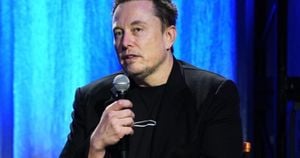Germany finds itself shaking under the weight of political tumult, and the fallout from this turbulence is being felt far beyond its borders. The collapse of Chancellor Olaf Scholz’s coalition government has left many wondering about the future direction of German politics and its international commitments, not least of which includes the country’s support for Ukraine amid its conflict with Russia.
The coalition, comprised of Scholz’s Social Democrats (SPD), the Greens, and the Free Democrats (FDP), crumbled recently over contentious budget discussions. These financial disagreements highlighted the rifts within the coalition as the parties squabbled over how to efficiently distribute economic resources. This internal conflict proved deadly for the coalition’s stability, which had promised transformative reforms for Germany but was hampered by its own conflicting agendas.
Now leading the wounded coalition is Chancellor Scholz, who is striving to pass key legislation before his government is officially pushed out. Scholz, referring to the importance of unified action, stated, "My proposal, my appeal to this house: Where we are unified, let us act unified. It would be good for our country," according to reports from DW News. Yet, the reality is increasingly bleak as opposition factions gain strength.
Among these opposition forces is the center-right bloc, now revitalized following the coalition's dissolution. This bloc, led by Friedrich Merz of the Christian Democratic Union (CDU), has warned Scholz not to expect any easy collaboration, stating they will not be the “reserve players” for his government. Political analysts are contemplating the ramifications of this antagonistic stance, as it implies possible gridlock for important future legislation.
A notable point of contention has been the need for continued financial support for Ukraine, which has broad support across German political factions, including the SPD, CDU, and Greens. The solidarity on this issue is partly driven by national interests, with the Foreign Office emphasizing the necessity of supporting Ukraine as aligned with Germany's own liberty. German Foreign Office spokesperson Christian Wagner articulated, "This government firmly believes supporting Ukraine must continue, not least because it aligns with our own interests," affirming Germany’s commitment to aiding Ukraine amid its fight for sovereignty.
While Wagner reassured partners of the German government’s unwavering commitment to Ukraine, the domestic fiscal turmoil does raise valid concerns about Germany's ability to maintain this support. Before the coalition's collapse, there were attempts to negotiate increased military aid for Ukraine within the 2025 budget. Now, those discussions are hanging by a thread, with uncertainty surrounding the broader strategic aims and financial scope Germany could offer moving forward.
Another factor complicates this mixture: the rise of the far-right Alternative for Germany (AfD) party. Amid the coalition's fragmentation, this party seeks to exploit the chaos, potentially positioning itself as the voice of discontent among voters dissatisfied with traditional politics. Political observers fear the AfD could make significant gains, particularly as the election scheduled for February 23, 2025, approaches.
Meanwhile, Scholz is still trying to navigate his government through pending legislative priorities. Some proposals, which previously had bipartisan support, are now at risk due to the shifting political terrain. For example, the assurance of “AfD-proofing” Germany’s Constitutional Court is among the limited topics where potential cooperation could still materialize. This proposal aims to secure the court against far-right influence.
Beyond domestic legislative battles, the question of Germany's foreign policy stance looms large. With tensions at boiling points across Europe and the necessity for united support for Ukraine, analysts are closely following how Germany will tackle these competing pressures. The coalition’s crumbling support system for international aid is set against the backdrop of existential crises occurring within continental Europe—thus, the slogan, “Germany is back!” may need rephrasing to “Germany is trying.”
Yet, Scholz's administration remains hopeful for certain outcomes. The CDU, for its part, has signaled potential support for urgent and necessary measures, particularly concerning economic recovery strategies. This includes tax relief efforts aimed at easing fiscal constraints facing many German households.
Unfortunately, many larger reforms, such as pension systems and child benefit increases, look destined to be shelved indefinitely. With both the CDU and FDP outright opposing proposals from the SPD, it appears likely these pivotal changes will need to wait for more stable governance.
The presence of the upcoming elections means political maneuvering will rule the roost. Maximizing the potential for political survival rather than implementing long-debated reforms may dominate party strategies heading toward the new year. The fate of the coalition government may cast shadows over how effectively Germany can engage with the world stage going forward.
Political experts labeled the situation as precarious, emphasizing the risk for the CDU and the strategies they would deploy against the SPD. Any cooperation with Scholz's government could backfire at the ballot box, especially coming from criticism by the far-right parties who are eager to dhese factions as seemingly indistinct from the political elite.
With the potential collapse of the coalition, what happens next hinges on the parties' willingness to compromise amid deepening divides. Germany’s future political stability and its engagement on the European and global stage now depend on urgent negotiations and political recalibrations among rival parties seeking to steer the country through tournament challenges at home and abroad.
Germany’s political crisis presents opportunities for populism, and the AfD along with other factions will likely use the uproar to sway public opinion and garner challengers to the status quo. Rhetoric around such populist movements is already stirring, as traditional politics finds itself caught between the flames of domestic unrest and international scrutiny.
The fallout from the German political crisis is just beginning, and as the nation approaches its next elections, voters will need to grapple with what leadership looks like amid rising extremism and nationalism. Only time will tell how this drama plays out, but for now, all eyes remain on Germany as it seeks to stabilize its governance and secure its international commitments, especially toward Ukraine, during such uncertain times.
Ensuring continued aid and support for Ukraine looms over German political discourse, and there’s no doubt this tension will encourage significant reflection throughout Europe about how internal politics can shape external relationships. The road forward remains fraught with challenges, but the persistence of both parties and people will dictate the nation’s capacity to adjust to the rising tides of political extremism and insecurity.



